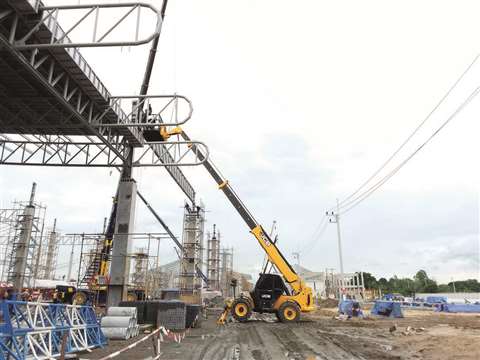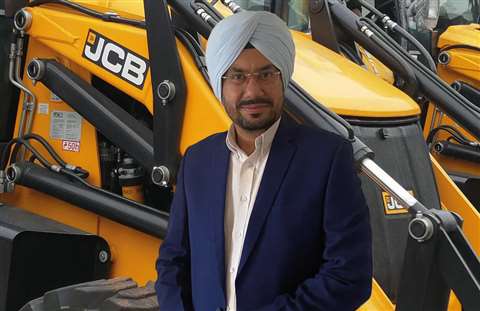Where are the new opportunities in the Thailand rental market?
05 November 2021
Thailand’s rental market remains strong amid the wider economic and social impact of Covid-19, representing an opportunity for new players, writes Belinda Smart.
Thailand’s rental market remains strong amid the wider economic and social impact of Covid-19, representing an opportunity for new players, writes Belinda Smart.
“The rental market is particularly strong in Thailand. We are seeing multinational rental players renewing their focus on Thailand as they develop new markets and new technologies.”
 Pictured is a JCB 540-170 Loadall telescopic handler working on a factory construction project in Pathum Thani Province, a tech hub situated just north of Bangkok in Thailand.
Pictured is a JCB 540-170 Loadall telescopic handler working on a factory construction project in Pathum Thani Province, a tech hub situated just north of Bangkok in Thailand.
This is the assessment of Rajbir Sandhu, JCB’s General Manager for Southeast Asia. While he doesn’t expand on those international players – almost certainly a reference to the major Japanese rental companies active in Thailand - he does confirm that rental providers in Southeast Asia, and particularly Thailand, are growing their businesses.
“They’re doing this in two ways: adding value to the rental service by increasing asset productivity through digital innovation and expanding coverage into new industries with less saturated product lines.”
Thailand’s construction rental market
The general construction rental market in Thailand is dominated by four Japanese-owned rental businesses, and all four of Japan’s ‘big four’ - Aktio, Kanamoto, Nishio Rent All and Nikken - as well as Japan’s Rent Corp are active in the market.
Their subsidiaries in Thailand are Aktio Thailand, which a large business, with as many as 600 employees and around 5,000 machines, while Nishio Rent All (Thailand) is also very active, with a special focus on access equipment. It is 15% owned by local contractor Italian-Thai Development (ITD).
Nikken operates two subsidiaries in the country, crane rental specialist TSK Diamond Rental and used equipment sales company NDT (Thailand). TSK was created in 2016 with Mitsubishi Corp (Nikken’s owner) and Nikken investing in TSK Crane Service to create TSK Diamond. Mitsubishi owns 35% of the business, Nikken 5% and TSK 60%.
Of the other Japanese-related renters in Thailand, Rent (Thailand) is a subsidiary of Rent Corp and has lately moved away from larger excavators and is focused more on smaller equipment and access. Siam Kanamoto, meanwhile, employs more than 100 people and recently moved into a new purpose-built head office in Bangkok.
JCB’s Sandhu tells IRN that while the effects of Covid 19 since early 2020 have impacted the market, this could be a positive for rental for Southeast Asia, in agriculture as well as construction.
“Countries are looking inwards to develop and expand their own agriculture supply chains. However, labour mobility restrictions due to Covid mean that equipment end users and rental firms are facing worker shortages.
“To combat this, multipurpose machines that can work in various stages of a process are required more than ever,” he says. “We are seeing buzz around the telescopic handler as a modern, efficient, and versatile alternative to the wheel loader.”
In Thailand, a significant Southeast Asian rental market, a shift towards rural projects such as infrastructure and development outside of Bangkok and the central regions is now underway. Add to this the fact that contractors are not fully investing in machinery purchases, and the result is “a great opportunity for rental companies to increase their revenues and customer bases.”
“Contractors in rural areas are increasingly expecting great service and uptime from their equipment suppliers. To address this demand, JCB has appointed a new dealer (Chairachakarn JCB) which has excellent coverage across Thailand, with eight branches and two more to open in the near future.”
“In Bangkok, construction projects have been on hold due to Covid outbreaks and lockdowns, but we foresee the industry rebounding quickly, as long as the mobility of labour and supply of equipment allow for it.”
Mini excavator market
Mini excavators have been a key product in the Thai equipment market for some time, and the sector is growing year on year, says Sandhu. “An increase in smaller residential and commercial developments outside of the Central and Bangkok regions, as well as a labour shortage, suggests that this trend of easy to use and versatile excavators will continue.”
Raven Chua, Head of Market Thailand at Volvo CE, says he expects the rental market to develop as more foreign contractors, particularly from China, enter the market; “they will take machines on a project basis at the lowest possible cost.”
He says Covid had an impact, but perhaps not as great as anticipated; “The market was expecting heavy impacts during lockdowns but many machine deliveries continued to take place.”
According to Taeick Kim, Director of Southeast Asia/Japan at Doosan Bobcat, says the preferred mini excavator model for the rental business in Thailand is the 3 tonne class.
He adds that for rental businesses, heavy machines are in higher demand than mini-excavators, “because for minis, customers can rent from small contractors/owners which is cheaper and more flexible.”
Aktio is a good customer for Bobcat’s mini excavators through its dealer Leadway Heavy Machinery (LHM), the Bobcat dealer in Thailand, which is also dealer for Sumitomo’s larger mexcavators.
 Rajbir Sandhu, JCB’s General Manager for South East Asia.
Rajbir Sandhu, JCB’s General Manager for South East Asia.
Bobcat is also currently educating the market on the benefits of skid-steer loaders, which are available only via Aktio Thailand, says Kim.
Thailand low emissions
Southeast Asia and the Thai market are yet to accelerate their uptake of low emissions machines, but, says JCB’s Rajbir Sandhu, this could be on the horizon, particularly with Thai representatives due to present at COP26 in Glasgow this November.
“Within three years, we hope zero emission machines will be a fundamental sector in the Thai equipment market”, says Sandhu, “It is likely that Bangkok will introduce low emission zones like London or Berlin, so we see plenty of applications for our zero emission and low noise electric excavator and telescopic handler.”
Driven by labour shortages and safer building and maintenance techniques, he predicts “the scissor lift will remain in high demand for the medium term across Southeast Asia.
“In the short to medium term, we see access equipment and multipurpose tools such as backhoe loaders and telescopic handlers driving demand. Multipurpose machines present an exciting opportunity for contractors to adapt to leaner operations and overcome the challenges presented by labour shortages and rural projects.”
For a report into how Vietnam is rallying in a post-covid world, click here.



